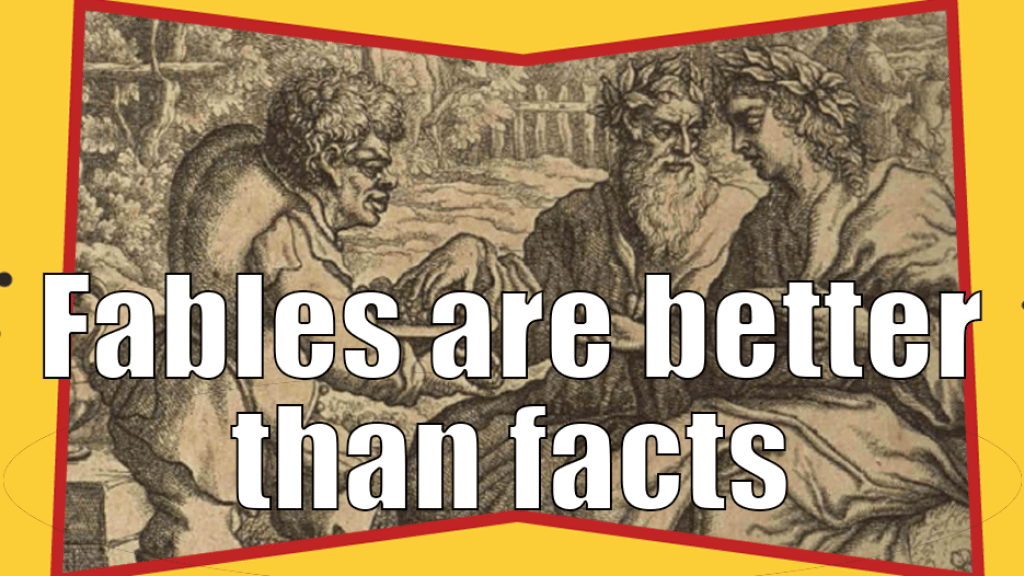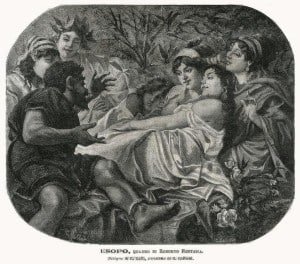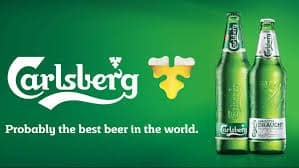
“…psychology has begun a serious study of how story affects the human mind. Results repeatedly show that our attitudes, fears, hopes, and values are strongly influenced by story. In fact, fiction seems to be more effective at changing beliefs than writing that is specifically designed to persuade through argument and evidence.”
Jonathan Gottschall, Why Storytelling is the Ultimate Weapon, FastCompany, May 2, 2012
Fiction is more effective at persuasion than evidence.
FICTION. More persuasive than EVIDENCE.
Allow me to demonstrate:

Elizabeth Griscom was an upholsterer who outlived eight of her sixteen siblings and three of her husbands. 4 decades after she died, Elizabeth’s grandson came forward to claim his grandmother was personally commissioned by General Washington to sew a flag. There is no proof that Betsy Griscom-Claypoole-Ashburn-Ross is in any way responsible for the American flag. But the story conveniently appeared in the early days of Women’s Suffrage and was said to inspire young women to get involved in politics. It was a fictional story that changed beliefs better than the facts.
Every culture is packed with folklore. Washington didn’t cut down a cherry tree, Robert Hod of York didn’t steal from the rich, and Hungary’s King Matthias the Just probably didn’t cavort with the commoners. There are modern examples like North Korea’s Kim Jung Il, who bowled a perfect 300 the first time he ever touched a bowling ball, and his son Kim Jung Un, who could drive at age 3. North Korean leaders also never use the toilet and are known for beautiful love letters.
Stories are mental shortcuts. They help us remember complex ideas. Greek mythologies teach us what happens when we “open Pandora’s box,” “summon a muse,” or accomplish a “Herculean task.” The Bible shows how the “David” in all of us can take down a Goliath, the value of being a “good Samaritan” and what it means to be a “Zealot.”
Stories are a key tool in effective advertising. Much like legends and fables, metaphors and allegories make an intricate concept understandable, memorable, and (most importantly) easy to recall:
“Like a good neighbor, State Farm is there.” Neighbors help and are reliable. You knew that before you knew about State Farm…and State Farm is just like that.
A bowl of cereal with an underwhelming amount of vitamins and protein is hardly enough sustenance to be the “Breakfast of Champions.” It’s a story you believe to be true because it might be your shortcut to being a champion yourself.
When the city of Las Vegas decided to acknowledge whatever story you were telling yourself about Sin City, they reinforced it by promising “What happens here, stays here.”
What story is hidden in these slogans:
- Maybe she’s born with it. Maybe it’s Maybelline
- A Diamond is Forever
- There are some things money can’t buy. For everything else, there’s Master Card”
- Carlsberg: Probably the best beer in the world

It’s easy to identify the product a customer is buying. Your challenge is to figure out what story the customer is buying.
Are they buying lawn care…Or are they buying pride?
Are they buying brakes…Or are they buying safety for their family?
Are they buying a hammer…Or a way to put a picture on the wall?
You’re not selling “things,” you’re selling a story. Every person you see with a Nike, Ralph Lauren, or Donna Karan logo has bought a story.
Stories “…seem to be more effective at changing beliefs than […] evidence.”
Aesop’s Fables have taught “slow and steady wins the race” and “never cry wolf.”
But what we don’t know is…was there ever an Aesop? It seems the legend of an ugly slave who earned his freedom through clever stories is, itself, a fable we bought.
…and keep selling generation after generation.
- Marketing Has a Physics Problem - December 3, 2025
- AI is OK - August 14, 2025
- Emotion in Advertising Equals Dollars in Business - December 3, 2024
